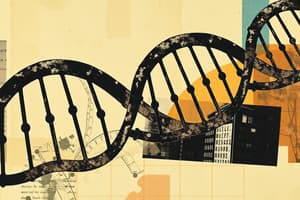Podcast
Questions and Answers
Which component of a cell is responsible for containing genetic information?
Which component of a cell is responsible for containing genetic information?
- Nucleus (correct)
- Cell membrane
- Mitochondria
- Cytoplasm
What is the primary function of proteins within a cell?
What is the primary function of proteins within a cell?
- Cellular respiration
- Enzymatic reactions (correct)
- Energy storage
- Cell communication
During which process is energy released in cells through reactions like cellular respiration?
During which process is energy released in cells through reactions like cellular respiration?
- Photosynthesis
- DNA replication
- Metabolism (correct)
- Protein synthesis
Which cellular organelle is responsible for the synthesis of proteins?
Which cellular organelle is responsible for the synthesis of proteins?
What is the main function of DNA replication in a cell during division?
What is the main function of DNA replication in a cell during division?
Which cellular compartment is primarily responsible for transforming matter and energy in cells?
Which cellular compartment is primarily responsible for transforming matter and energy in cells?
What is the main function of apoptosis in cell biology?
What is the main function of apoptosis in cell biology?
In cell biology, what initiates cascades that influence gene transcription?
In cell biology, what initiates cascades that influence gene transcription?
What is the common starting point for students studying cell biology?
What is the common starting point for students studying cell biology?
Which advanced degree is commonly pursued after completing a bachelor's degree in biology in the field of cell biology?
Which advanced degree is commonly pursued after completing a bachelor's degree in biology in the field of cell biology?
What is the primary purpose of cells receiving signals and activating specialized protein kinases in cell biology?
What is the primary purpose of cells receiving signals and activating specialized protein kinases in cell biology?
Flashcards are hidden until you start studying
Study Notes
Understanding Cell Biology
Cell biology is a fundamental branch of biology focused on studying cells—the smallest units of life. Cells are the building blocks of living organisms and come in varying shapes and sizes, often specializing in unique functions within tissues or organs. Understanding cell biology requires a deep understanding of how cells develop, function, reproduce, and respond to their environment.
Key Concepts in Cell Biology
-
Cell Structure: Each cell has a defined structure consisting of a nucleus containing genetic information, cytoplasm filled with fluid and proteins, and various membranes enclosing compartments called organelles.
-
DNA Replication: Every time a cell divides, its DNA must be copied so that each daughter cell receives a complete copy of the genetic material. This process ensures accurate transmission of genetic information across generations.
-
Protein Synthesis: Genetic information encoded in DNA is used to create proteins that serve essential functions within the cell, such as enzymes, hormones, structural components, and immunoglobulins.
-
Metabolism: The transformation of matter and energy occurs within cells via metabolic pathways involving organic molecules like carbohydrates, lipids, and proteins. Energy is released through reactions like photosynthesis in plants and cellular respiration in animals.
-
Signal Transduction: Cells receive signals from their surroundings, activate specialized protein kinases, and initiate cascades that ultimately influence gene transcription, leading to appropriate responses.
-
Apoptosis (Programmed Cell Death): Although cells divide rapidly, they sometimes die naturally through apoptosis. This controlled form of cell death regulates tissue size and removes damaged cells.
Educational Pathway
Studying cell biology typically begins with introductory courses in high school biology programs. At the university level, students pursue bachelor's degrees in biology, chemistry, or molecular biophysics before entering advanced degrees like master's or PhD programs in cell biology. Research assistantships are commonly sought after for hands-on experience in actual laboratories, working alongside scientists in biology research settings.
Studying That Suits You
Use AI to generate personalized quizzes and flashcards to suit your learning preferences.




